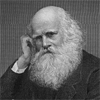
Mr. Bryant was born in Cummington, Massachusetts, on the third day of November, 1794. At a very early age he gave indications of superior genius, and his father, an eminent physician, distinguished for erudition and taste as well as for extensive and thorough knowledge of science, watched with deep interest the development of his faculties under the most careful and judicious instruction. At ten years of age he made very credible translations from some of the Latin poets, which were printed in a newspaper at Northhampton and during the vehement controversies between Federalists and Democrats, which marked the period of Jefferson's administration, he wrote, "The Embargo," a political satire, which was printed in Boston in 1809. . . . The satire was directed against President Jefferson and his party. . . .
Some of the democrats affected to believe that Master Bryant was older than was confessed, or that another person had written, "The Embargo;" but the book was eagerly read, and in a few months a second edition appeared, with some additional pieces. . . .
In the sixteenth year of his age, Bryant entered an advanced class of Williams College, in which he soon became distinguished for his attainments generally, and especially for his proficiency in classical learning. In 1812 he obtained from the faculty an honourable discharge, for the purpose of entering upon the study of the law, and in 1815 he was admitted to the bar, and commended the practice of his profession in the village of Great Barrington, where he was soon after married.
When but little more than eighteen years of age he had written his noble poem of "Thanatopsis," which was published in the North American Review for 1816. In 1821 he delivered before the Phi Beta Kappa Society of Harvard College his long poem, "The ages," in which, from a survey of the past eras of the world, and of the successive advances of mankind in knowledge, virtue, and happiness, he endeavors to justify and confirm the hopes of the philanthropist for the future destines of man. It is in the stanza of Spenser, and in its versification is not inferior to "The Faerie Queene." "To a Waterfowl," "Inscription for an entrance to a Wood," and several other pieces of nearly as great merit were likewise written during his residence at Great Barrington.
Having passed ten years in successful practice in the courts, he determined to abandon the uncongenial business of a lawyer, and devote his attention more exclusively to literature. With this view, in 1825, he removed to the city of New York, and with a friend, established "The New York Review and Athenaeum Magazine," in which he published several of his finest poems, and in "The Hymn to Death" paid a touching tribute to the memory of his father, who died in that year. In 1826 he assumed the chief direction of the "Evening Post," one of the oldest and most influential political and commercial gazettes in this country, with which he has ever since been connected. In 1827, 1828, and 1829, he was associated with Mr. Verplank and Mr. Sands in the production of "The Talisman," an annual; and he wrote two or three of the "Tales of Glauber Spa," to which, besides himself, Miss Sedgwick, Mr. Pauling, Mr. Leggett, and Mr. Sands were contributors. An intimate friendship subsisted between him and Mr. Sands, and when that brilliant writer died, in 1832, he assisted Mr. Verplanck in editing his works.
In the summer of 1834, Mr Bryant visited Europe, with his family, intending to devote a few years to literary studies, and to the education of his children. He travelled through France, Germany, and Italy, and resided several months in each of the cities of Florence, Pisa, Munich, and Heidelberg. The dangerous illness of his partner and associate, the late William Leggett, compelled him to return hastily in the early part of 1836. The summer of 1840 he passed in Florida and the Valley of the Mississippi, and in 1844 he revisited Europe. . . .
In 1832 a collection of all the poems Mr. Bryant had then written was published in New York; it was soon after reprinted in Boston, and a copy of it reaching Washington Irving, who was then in England, he caused it to be published in London, where it has since passed through several editions. In 1842 he published "The Fountain and Other Poems;" in 1844 "The White-footed Deer and other Poems;" in 1846 an edition of his complete Poetical Words, illustrated with engravings from pictures by Leutze; and in 1855 another edition, containing his later poems, in two volumes. In prose . . . [he published] "Letters of a Traveller;" this appeared in 1852; and he has since revisited Europe and made a journey through Egypt and the Holy Land.
*******
(Above text by Rufus Wilmot Griswold, The Poets and Poetry of America 169-170 New York: James Miller, Publisher, 1872.)
See also: The Works of William Cullen Bryant, by Edgar Allan Poe.
Copyright © D. J. McAdam· All Rights Reserved